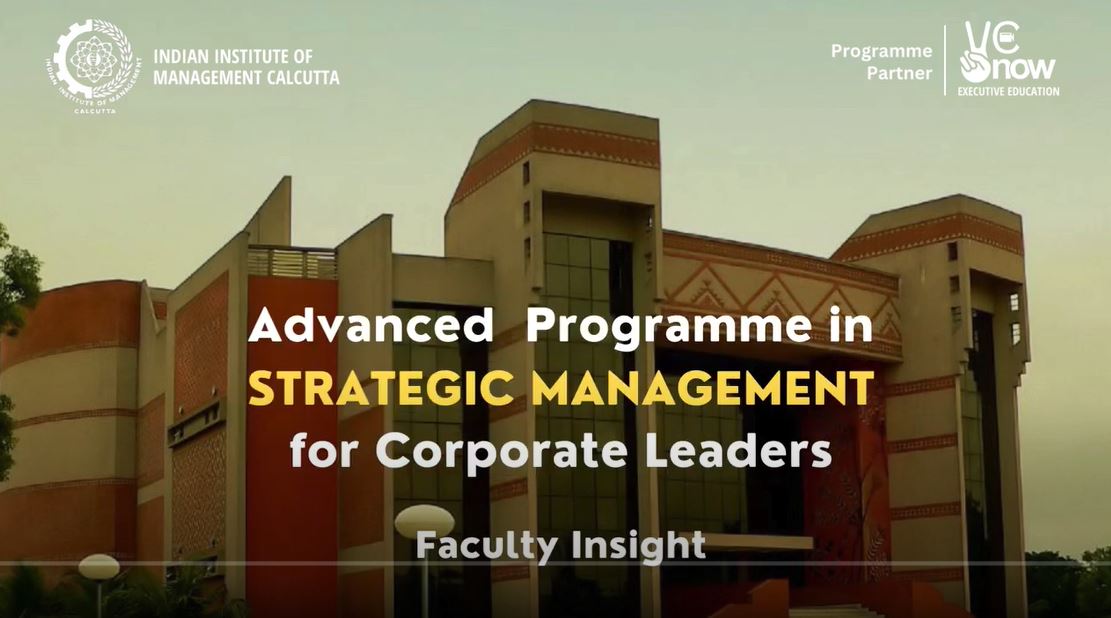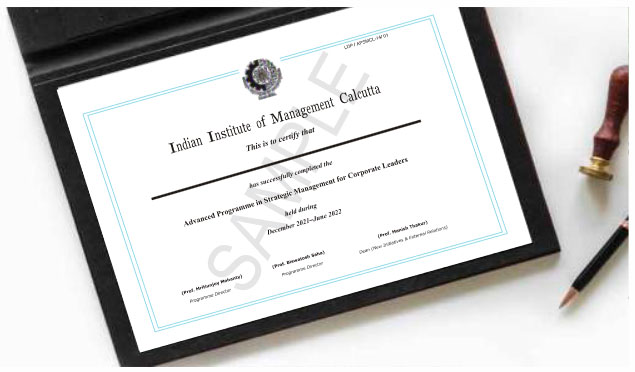 Programme Highlights
Programme Highlights

Duration
8 months

Eligibility
7+ years of experience

Live Sessions
Live online sessions every Friday (6 PM to 9 PM)

On Campus
11 days on-campus module

Alumni Status
IIM Calcutta Completion Certificate and Executive Education Alumni Status

Batch Commences
To be announced soon

Fees
Fee INR 4,38,000
Payable in easy instalments*.
Loan assistance is also available.
 Programme Overview & Objectives
Programme Overview & Objectives
Programme Overview
Increasingly, strategic management is becoming crucial in the world of business and in the ever uncertain and dynamic world in which we live and work. The APSMCL programme is designed for Corporate Leaders who wish to translate Strategy into value driven decisions and pave their way towards sustainable growth. Current business contexts are defined by intense pressures of competition, integration across global markets, new concerns about sustainability and an intensification of resource conflicts around the world, technological changes including the use of information technology and massive institutional transitions/ transformations. These both frame and challenge a firm’s ambitions of growth requiring them to take risks as they navigate through change.
Strategy is a mode of thinking that leverages the power of individuals, institutions, firms and markets in a cohesive manner to improve the effectiveness of an organization. Hence, we can call it the exercise of power. It is a skill and a craft. Strategy is thus fundamentally about governance. Power can of course be sought for its own sake and therefore crafty strategists in its pursuit may deform and transform business and societal spaces and existing institutions, even while setting ‘new rules of the game’.
These require institutional work to be carried out that can embrace the ‘social’ and ‘political’ even as it retains the core concern with the economic calculus of a firm’s strategizing.
Globalization and more intense international flows of resources and ideas are bringing firms that were nurtured in ‘specific historically constructed national institutional settings, to compete in global markets. Understanding the institutional setting of rival and/or partner firms so as to better appreciate their strengths and weakness adds an additional layer of complexity to the strategic endeavor in a globalizing context. Navigating the challenges of global competition therefore requires an appreciation, not only of the strategic moves a firm can make – but more importantly how these relate to and interweave with the broader institutions that frame and define strategic action.
This course therefore presumes that strategic action, of competition or cooperation, always is embedded in societal, institutional and regulatory contexts. Rather than looking at these as constraints, it helps if one can appreciate how wins can be crafted and power effectively leveraged working within and through these broader institutions, to the benefit of both firm and society.

Learning Outcomes

Develop a strategic mindset for adapting to complexity and shifting power dynamics.

Understand the strategic landscapes of industries and the economics behind strategic moves.

Understanding sustainability, resource conflicts and its relation to strategy

Discerning the strategic significance of few contemporary developments such as outsourced models of business, vigorous use of informatics, delayering of organizations, modularization of product systems and so on

Strategizing in a network mode -competition and cooperation; specially appreciating role of shared assets

Economics of strategy moves, especially under decreasing and ncreasing returns

Managing multi-stakeholder interests and institutional frameworks thereof, especially of work-force/skill-holders and communities with various resource rights
 Curriculum Structure
Curriculum Structure
-
Strategic Thinking

The science behind strategy landscapes and relations of conflicts and cooperations.
-
Competitive Advantages

Competitive advantages in product/services businesses; understanding creation and destructions of moats, economics of digital ecosystems and platforms, economics of scaling or non-linear profit growth.
-
Managing

Contracting, outsourcing and modularization, developing clarity on where, when and how to push for cooperation.
-
Organizational Design

Structuring and designing large organisations, clarifying operational, middle and top management roles, leading and mobilising people, strategy practices and organisational routines, leading people and organisations through technological and institutional transitions.
-
Business Models

Business model and why it is disruptive, growing a start-up from Zero-to-One, cash burn, Venture Capital, creating a start-up culture inside a large firm.
-
Corporate Strategies

Corporate strategies, corporate restructuring and M&A.
-
Institutional Frameworks

Appreciating institutions and the way it shapes organising for business; varieties of capitalism, developing a cross-country comparative canvass of economic growth and well-being, understanding the new strategic role of the State in business affairs.
-
Strategic Communications

The art and science of strategic leadership, strategic communication, competing on narratives.
 Why should you pursue this Programme?
Why should you pursue this Programme?
- Prepare for leadership roles and position yourself for growth by learning to plan and execute strategy.
- Immerse yourself in the IIM Calcutta campus experience during a 11-day on-campus session, complemented by expert-led immersive live video lectures.
- Undertake a comprehensive Capstone Project under the guidance of seasoned faculty from IIM Calcutta.
- Expand your professional network by engaging in collaborative projects and discussions with experienced peers.
- Benefit from the rich legacy of the 15 successful batches of the programme
 How to Apply
How to Apply

Step 1Register for the programme

Step 2Pay the Application Fees

Step 3Login with the Credentials shared

Step 4Upload verified documents

Step 5Accept the Offer Letter sent by the Institute

Step 6Complete the 1st Installment fee and commence the course
Interested applicants may apply online through the following online application link – https://iimcalcutta.vcrvcnow.in/APSMCL-17/student-registration/lms.phpThe application most be complete in all respects including remittance of application fees, uploading of academic and experience related documents and submission of Statement of Purpose (SOP) & Profile. Incomplete applications will not be considered for further processing. In case of any assistance during the application process, please reach out to our Academic Advisors on +91 8506099081/ +91 9219078715 (9 AM to 9 PM).
 Payment of Fees
Payment of Fees
Fees
| Application Fee (Non-Refundable) | INR 2,500 + GST |
| Programme Fee | INR 438,000 + GST |
Programme Fee and Campus Module Charges
|
Installment - I
Within 10 days of issuance of offer letter
INR 1,48,000 (GST Extra)
|
Installment - II
To be announced
INR 1,45,000 (GST Extra)
|
Installment - III
To be announced
INR 1,45,000 (GST Extra)
|
 Methodology, Evaluation and Certification
Methodology, Evaluation and Certification
Evaluation in this programme would be based on examination at the end of the course and a project that the participants would undertake, either singly or in groups as per decision of the faculty.
At the end of the course eligible students will receive a certificate of completion of the programme from IIM Calcutta, along with a grade sheet carrying grade of the examination and the project. It is mandatory for participants to attend the campus sessions for successful completion of the programme.
Note: Certificate image is for reference purpose only and may change at the

 About Institute
About Institute
The Indian Institute of Management Calcutta (IIMC) was established as the first national institute for Post-Graduate studies and Research in Management by the Government of India in November 1961 in collaboration with Alfred P. Sloan School of Management (MIT), the Government of West Bengal, The Ford Foundation and Indian industry. Over the past four decades, IIM Calcutta has blossomed into one of Asia’s finest Business Schools. It has been playing a pioneering role in professionalizing Indian management through its Post Graduate and Doctoral level programs, Executive Training Programs, Research and Consulting Activities. Today, IIM Calcutta attracts the best talent in India – a melting pot of academia, industry and research. The best and brightest young men and women pursue its academic programs. The main thrust of training is to imbibe a sense of strategic outlook to management problems in the students. The emphasis, therefore, is on management as an integrated process and requires the students to develop a global view of economic, technological, cultural and political environment of the business. IIMC has a very strong alumni base, which makes it unique among the top management institutes of the world. IIMC alumni are occupying leadership positions as corporate managers, academicians and successful entrepreneurs, worldwide. The alumni maintain a close relation with the institute, helping each other in their growth.
 Programme Director
Programme Director








